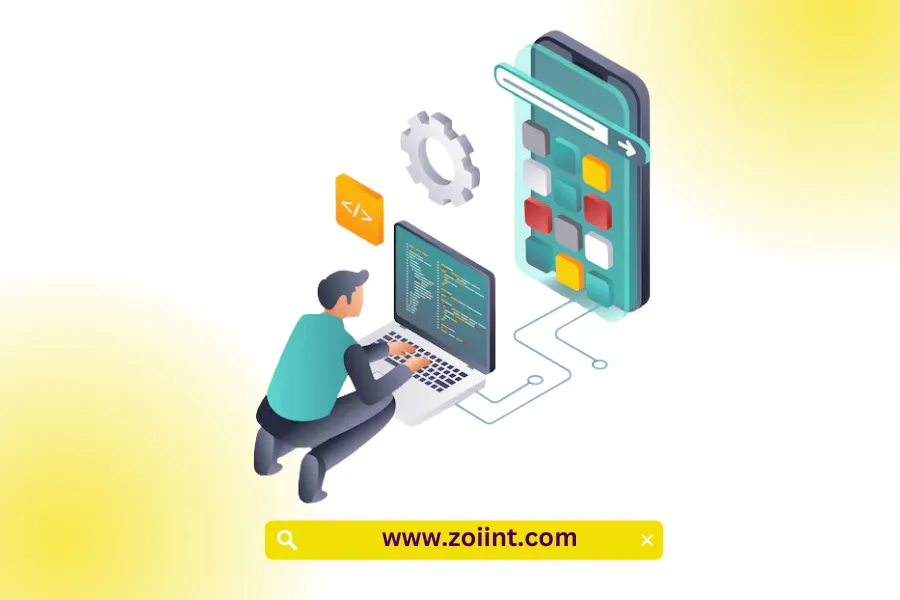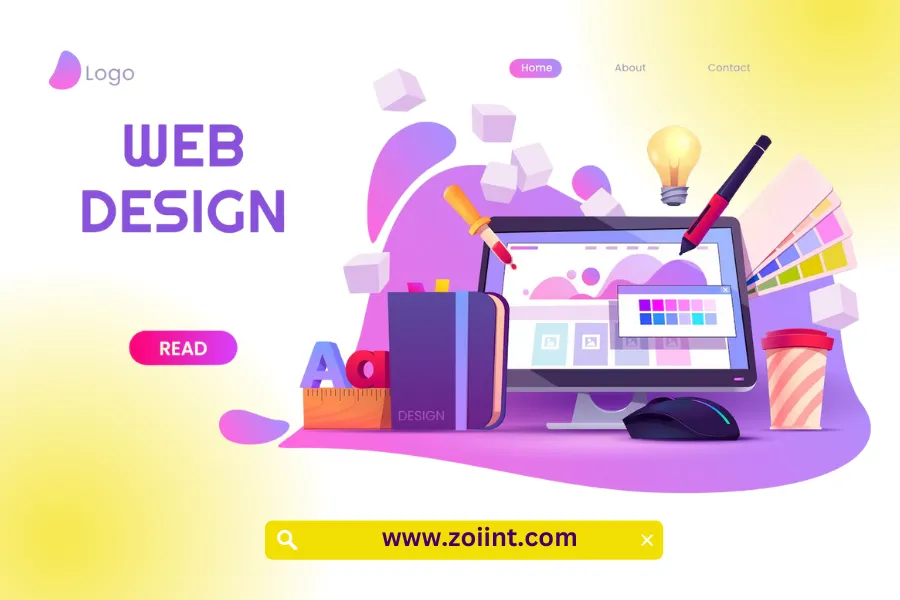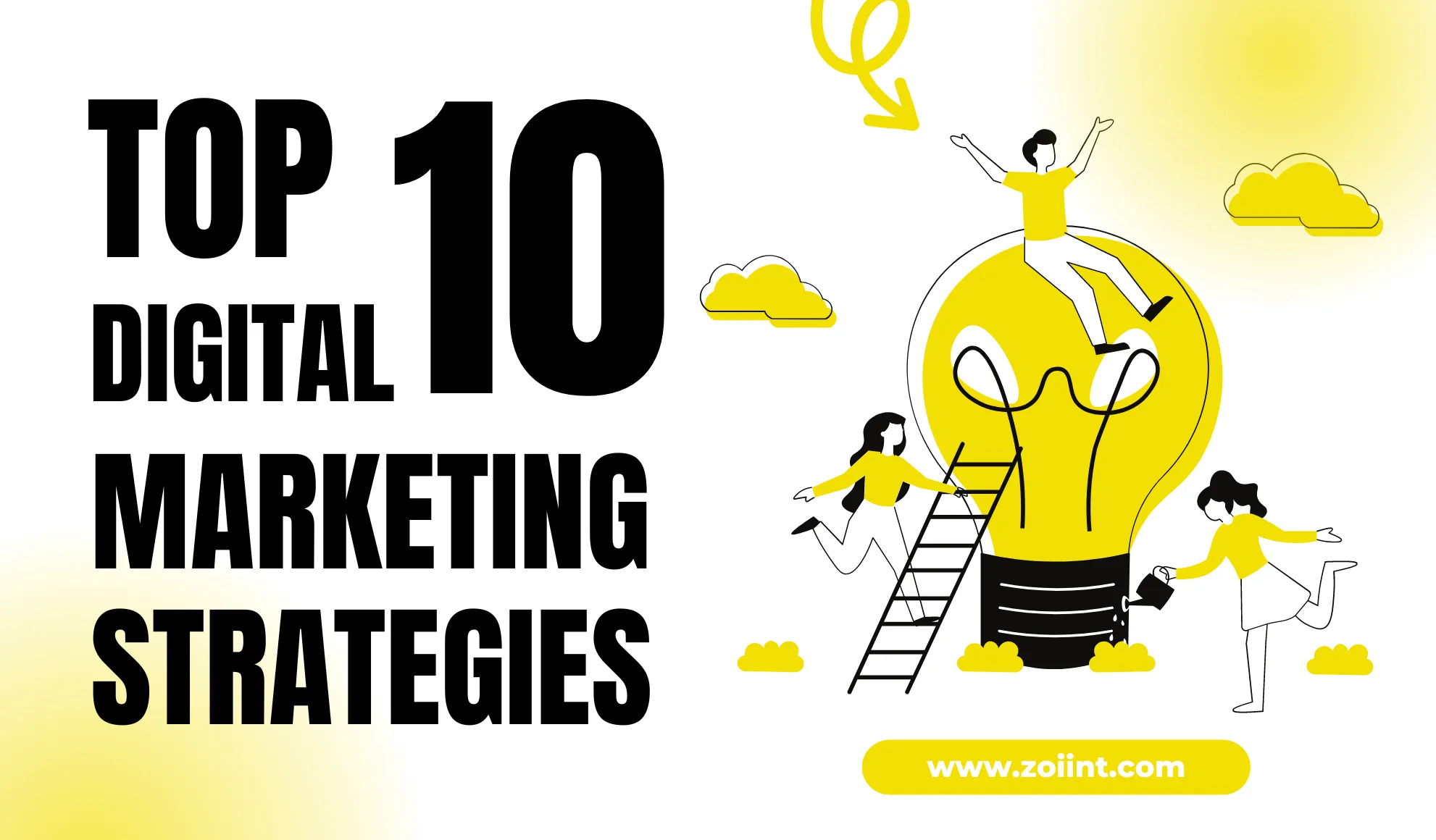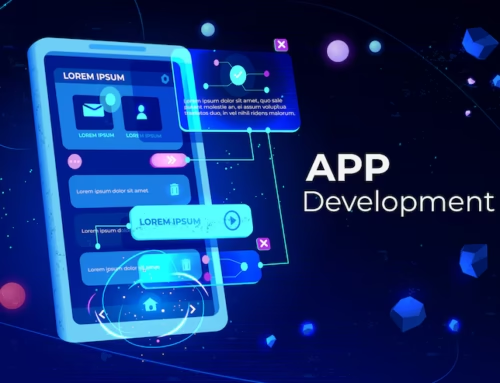In today’s fast-paced digital world, businesses must constantly adapt their marketing strategies to remain competitive. With each passing year, new trends, tools, and technologies emerge, making it essential for companies to stay informed and agile.
A well-executed digital marketing strategy is crucial for businesses aiming to enhance their online presence, engage with their audience, and drive growth. In this blog, we’ll delve into the top 10 digital marketing strategies that will help your business thrive.
What is a Digital Marketing Strategy?
A digital marketing strategy is a comprehensive plan that outlines how a business will achieve its marketing objectives using various online channels. It encompasses everything from identifying target audiences to choosing the right digital tools and tactics to engage with them effectively. A well-crafted strategy is not just about increasing traffic or generating leads; it’s about creating a seamless experience for your audience, building trust, and fostering long-term relationships.
In essence, a digital marketing strategy serves as a roadmap that guides a business’s online activities. It helps align marketing efforts with business goals, ensuring that each campaign contributes to the overall growth of the company. Whether you’re aiming to increase brand awareness, boost sales, or improve customer retention, having a clear digital marketing strategy is essential for success in today’s competitive landscape.
10 Types of Digital Marketing Strategies
1. Search Engine Optimization (SEO)

Search Engine Optimization (SEO) is the process of optimizing your website to improve its visibility on search engines like Google. The goal is to rank higher in search results for relevant keywords, making it easier for potential customers to find you. SEO is important because it involves various tactics, including keyword research, on-page optimization (such as meta tags, headers, and content), and off-page optimization (such as link building). SEO is continuing to be a vital component of digital marketing, with a strong focus on user experience, mobile-friendliness, and voice search optimization.
A solid SEO strategy not only drives organic traffic but also establishes your brand’s authority in your industry. By consistently providing valuable content that addresses your audience’s needs, you can improve your search engine rankings and attract high-quality leads.
2. Pay-Per-Click (PPC) Advertising
Pay-Per-Click (PPC) advertising is a paid marketing strategy where advertisers pay a fee each time their ad is clicked. PPC ads can appear on search engines, social media platforms, and other websites, offering businesses a way to drive immediate traffic and generate leads. Google Ads is one of the most popular PPC platforms, allowing businesses to bid on keywords and display ads to users searching for those terms.
PPC advertising is highly effective for targeting specific audiences and achieving quick results. By carefully selecting keywords, creating compelling ad copy, and setting a budget, you can maximize your return on investment (ROI). Additionally, PPC campaigns provide valuable data that can be used to refine your strategy and improve future campaigns.
3. Content Marketing
Content marketing is a strategic approach focused on creating and distributing valuable, relevant, and consistent content to attract and retain a clearly defined audience. This content can take various forms, including informatic blog posts, articles, videos, infographics, podcasts, and ebooks. The primary goal of content marketing is to educate, entertain, or inspire your audience while subtly guiding them toward your products or services.
Content marketing will continue to be a cornerstone of digital marketing strategies. High-quality, engaging content not only helps with SEO but also builds trust and credibility with your audience. By addressing their pain points and providing solutions, you can position your brand as a thought leader in your industry.
4. Mobile Marketing

Mobile marketing is the practice of reaching your audience on their mobile devices, such as smartphones and tablets. With more people accessing the internet via mobile devices than ever before, mobile marketing has become essential for businesses looking to connect with their audience on the go.
Mobile marketing strategies can include SMS marketing, mobile app development, mobile-optimized websites, and location-based advertising. In future, businesses will need to prioritize mobile-friendly content and user experiences to stay competitive. This includes optimizing websites for mobile devices, creating mobile-specific content, and leveraging mobile advertising platforms.
5. Email Marketing
Email marketing is a powerful tool for nurturing leads, building relationships, and driving conversions. By sending targeted emails to your subscribers, you can deliver personalized content that resonates with their interests and needs. Email marketing campaigns can include newsletters, promotional offers, product announcements, and more.
One of the key advantages of email marketing is its ability to reach a highly engaged audience. Unlike social media, where algorithms dictate what users see, email marketing allows you to communicate directly with your audience. Personalization and automation plays a significant role in email marketing, enabling businesses to deliver more relevant and timely content to their subscribers.
6. Social Media Marketing
Social media marketing involves using platforms like Facebook, Instagram, LinkedIn, and Twitter to promote your brand and engage with your audience. Social media provides businesses with a unique opportunity to connect with their audience on a more personal level, fostering brand loyalty and driving engagement.
Social media marketing campaigns will continue to evolve, with a growing emphasis on video content, live streaming, and influencer partnerships. A social media marketing campaign can feature one or several types of social media platforms, like:
7. Public Relations (PR)
Public relations (PR) is the practice of managing your brand’s reputation and building positive relationships with the public, including customers, stakeholders, and the media. In the digital age, PR has expanded to include online activities such as managing social media profiles, securing online press coverage, and responding to online reviews.
Effective PR can significantly enhance your brand’s credibility and visibility. By getting featured in reputable publications, blogs, and social media platforms, you can reach a wider audience and build trust with potential customers. PR strategies are increasingly focused on digital channels, with a strong emphasis on storytelling and authentic communication.
8. Video Marketing
Video marketing involves using video content to promote your products or services, educate your audience, and build brand awareness. With the rise of platforms like YouTube, TikTok, and Instagram Reels, video content has become one of the most engaging and shareable forms of content online.
From explainer videos and product demos to customer testimonials and behind-the-scenes footage, video content offers endless possibilities for connecting with your audience. To succeed in video marketing, businesses should focus on creating high-quality, visually appealing content that tells a compelling story.
9. Web Design

Web design plays a crucial role in your digital marketing strategy. A well-designed website not only makes a strong first impression but also enhances user experience, improves SEO, and drives conversions. In the next upcoming years, website design and development trends will continue to emphasize minimalism, mobile responsiveness, fast loading times, and accessibility.
Your website is often the first interaction potential customers have with your brand, so it’s essential to make it user-friendly and visually appealing. A clean, intuitive website and graphic design can guide visitors through your site, making it easy for them to find the information they need and take action, whether it’s making a purchase, signing up for a newsletter, or contacting your team.
10. Affiliate Marketing
Affiliate marketing is a performance-based strategy where businesses partner with affiliates (individuals or other businesses) to promote their products or services. In exchange for driving traffic or sales, affiliates earn a commission. This strategy is particularly effective for reaching new audiences and generating sales without significant upfront costs.
Affiliate marketing grows as more businesses recognize its potential for driving revenue. To succeed in affiliate marketing, businesses should focus on building strong relationships with their affiliates, providing them with the tools and resources they need to promote products effectively, and tracking their performance to optimize results.
Why are Digital Marketing Strategies Important?
Digital marketing strategies are essential for businesses of all sizes. They provide a structured approach to reaching your target audience, building brand awareness, and generating leads. In today’s digital age, where consumers are bombarded with information and options, having a clear and effective strategy is crucial for standing out from the competition.
A well-defined digital marketing strategy helps businesses:
- Align Marketing Efforts with Business Goals: By setting specific goals and objectives, businesses can ensure that their marketing efforts contribute to their overall growth and success.
- Target the Right Audience: Understanding your target audience allows you to tailor your messaging and offers to meet their needs, increasing the likelihood of conversion.
- Maximize ROI: By selecting the right channels and tactics, businesses can allocate their marketing budget more effectively, achieving better results with less waste.
- Measure Success: A digital marketing strategy includes key performance indicators (KPIs) and reporting tools that allow businesses to track their progress and make data-driven decisions.
Without a well-thought-out strategy, marketing efforts can become scattered and ineffective, resulting in wasted resources and missed opportunities. Businesses that invest in a comprehensive digital marketing strategy will be better positioned to succeed in an increasingly competitive marketplace.
How to Build a Digital Marketing Strategy – 7 Steps
Building a digital marketing strategy requires careful planning, research, and execution. Here’s a step-by-step guide to help you create a winning strategy:
Step 1. Identify Your Audience
Understanding your target audience is the foundation of any successful marketing strategy. Start by creating detailed buyer personas that include demographic information, pain points, goals, and online behaviors. The more you know about your audience, the better you can tailor your marketing efforts to meet their needs.
Step 2. Define Your Goals and Objectives
Set clear, measurable goals that align with your business objectives. Whether it’s increasing website traffic, generating leads, or boosting sales, your goals will guide your strategy. Make sure your goals are smart to ensure they are realistic and attainable.
Step 3. Evaluate Your Competitors
Analyzing your competitors can provide valuable insights into what works and what doesn’t in your industry. Identify their strengths and weaknesses, study their marketing strategies, and look for opportunities to differentiate your brand. Competitive analysis can also help you discover gaps in the market that you can capitalize on.
Step 4. Determine Your Digital Marketing Channels
Choose the digital marketing channels that are most effective for reaching your target audience. This could include SEO, PPC, social media, email marketing, and more. Consider where your audience spends their time online and which channels align with your business goals.
Step 5. Outline Your Content Strategy
Content is at the heart of digital marketing. Develop a content strategy that outlines the types of content you’ll create, how often you’ll publish, and how you’ll distribute it across your chosen channels. Your content should be valuable, relevant, and aligned with your audience’s interests and needs.
Step 6. Set Up Your Reporting Tools
Use tools like Google Analytics, SEMrush, or HubSpot to track your progress and measure the effectiveness of your strategy. Regular reporting will help you make data-driven decisions and optimize your campaigns for better results.
Step 7. Delegate Responsibilities to Your Team
Assign roles and responsibilities to your team members to ensure smooth execution of your digital marketing strategy. Clear communication and collaboration are key to success. Make sure everyone understands their role in the strategy and has the resources they need to succeed.
Conclusion
If you need help with your digital marketing strategy, contact Zoi International, a leading digital marketing agency, to discuss how our team can create a customized plan that takes your business to the next level. With our expertise and innovative approach, we can help you navigate the complexities of digital marketing and achieve sustainable online growth.
By implementing these top 10 digital marketing strategies, you’ll be well-equipped to drive online growth and success. Whether you’re a small business looking to increase visibility or a large enterprise aiming to dominate your industry, a well-executed digital marketing strategy is the key to achieving your goals.
FAQs About Digital Marketing Strategies
Q: How long does it take to see results from a digital marketing strategy?
A: The timeline for seeing results can vary depending on the strategy. SEO and content marketing may take several months, while PPC and social media campaigns can yield quicker results.
Q: What is the most effective digital marketing strategy?
A: The effectiveness of a strategy depends on your business goals and target audience. A combination of SEO, content marketing, and social media marketing is often highly effective.
Q: How much should I budget for digital marketing?
A: Your budget will depend on your business size, goals, and the channels you choose. It’s essential to allocate your budget strategically across different channels for maximum impact.
Q: Can I handle digital marketing on my own, or should I hire a professional?
A: While some businesses manage their digital marketing in-house, others find it beneficial to contact digital marketing agency or consultant. If you have the expertise and resources to handle digital marketing on your own, you can certainly manage it in-house. However, if you’re looking for specialized knowledge, scalability, and access to the latest tools and trends, hiring a professional can be a smart investment.





